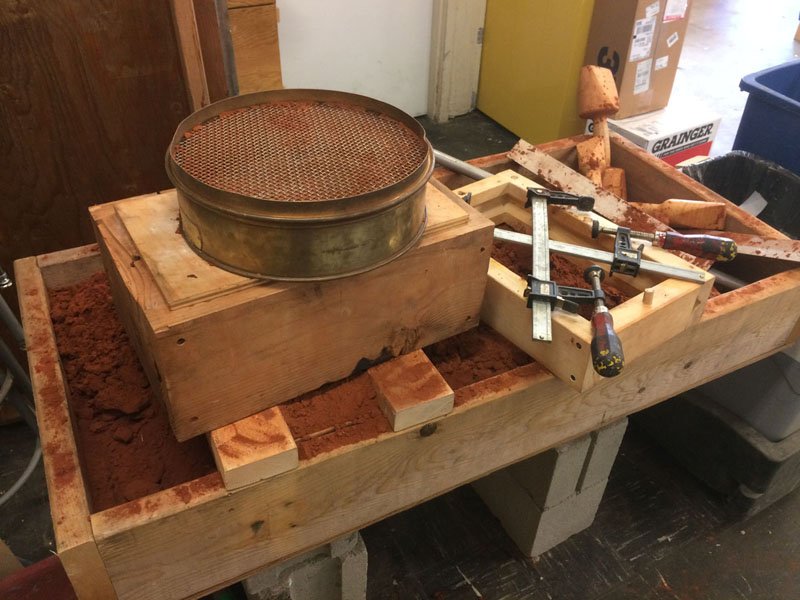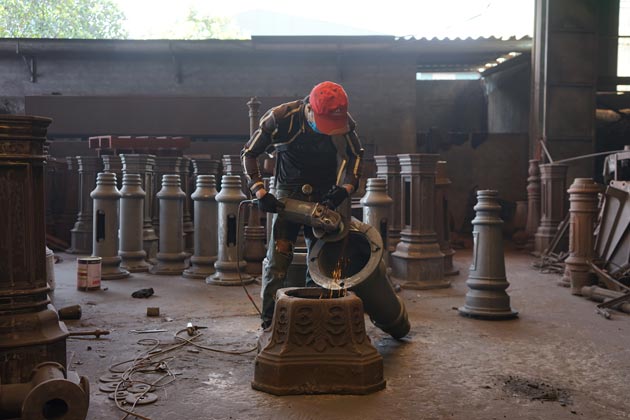Discover the benefits of Aluminum Foundry Wisconsin for current casting projects
Wiki Article
Understanding the Advantages and Innovations in the Aluminum Foundry Sector
The Aluminum Foundry sector plays an important function in modern production. Its light-weight residential properties especially boost gas efficiency, especially in aerospace and auto markets. On top of that, Aluminum's resistance to rust warranties long life in different applications. As the market evolves, developments such as innovative recycling and additive production are improving production techniques. Checking out these improvements discloses not just the advantages however likewise the difficulties ahead for Aluminum foundries in a rapidly changing market.The Lightweight Benefit of Aluminum
Aluminum's light-weight nature supplies substantial benefits across various industries, particularly in production and transport. Its low density permits the manufacturing of elements that are much easier to set up and handle, resulting in lowered labor prices and improved effectiveness. In the automotive field, lighter cars add to boosted gas economic situation and lower emissions, straightening with worldwide sustainability goals. In aerospace, the usage of Aluminum reduces the general weight of aircraft, which is important for improving efficiency and decreasing functional costs.In addition, Aluminum's lightweight homes assist in cutting-edge designs that were formerly unfeasible with much heavier materials. This adaptability enables makers to create complicated forms and structures while preserving architectural integrity. Generally, the lightweight advantage of Aluminum not just boosts product performance yet also drives improvements in modern technology and style, making it a recommended material in different applications.
Deterioration Resistance and Sturdiness
The Aluminum Foundry sector is renowned for producing materials with remarkable deterioration resistance, making them perfect for different applications. This property, combined with enhanced architectural honesty, adds to the durable performance benefits that Aluminum elements offer. Therefore, industries increasingly depend on Aluminum to fulfill requiring ecological problems without endangering quality.
Superior Corrosion Resistance
While various steels face significant challenges from ecological variables, Aluminum sticks out for its exceptional corrosion resistance, making it a recommended choice in lots of applications. This residential property is primarily as a result of an all-natural oxide layer that creates on the Aluminum surface area, offering a barrier against dampness and harsh agents. Unlike various other metals that may rust or weaken over time, Aluminum preserves its stability also in harsh settings, such as coastal locations or commercial setups. Additionally, its light-weight nature incorporated with corrosion resistance makes it perfect for applications in aerospace, automotive, and aquatic markets. Overall, Aluminum's exceptional toughness not only enhances product longevity yet likewise reduces upkeep expenses, presenting an engaging advantage for customers and suppliers alike.Enhanced Architectural Stability
Engineers and developers significantly identify the value of enhanced structural honesty in modern-day applications, where both corrosion resistance and toughness are crucial. Aluminum alloys, known for their lightweight buildings, also exhibit exceptional resistance to corrosion, making them suitable for severe atmospheres. The innovative techniques utilized in the Aluminum Foundry sector add considerably to producing elements with enhanced longevity. Advanced casting procedures and alloy compositions are customized to satisfy particular efficiency demands, making sure that frameworks can stand up to extreme problems without jeopardizing integrity. Moreover, surface treatments and layers enhance the life expectancy of Aluminum products, additionally mitigating deterioration over time. This concentrate on boosted architectural honesty not only expands the use of materials yet additionally minimizes maintenance prices, strengthening Aluminum's setting as a material of option in various industries.Resilient Performance Conveniences
Resilient efficiency in Aluminum parts is mainly connected to their exceptional deterioration resistance and resilience. Unlike several metals, Aluminum naturally forms a safety oxide layer, which prevents rust and deterioration in various settings, consisting of aquatic and industrial setups. This fundamental property substantially extends the life expectancy of Aluminum items, lessening upkeep and substitute costs. Additionally, the light-weight nature of Aluminum enhances its applicability throughout industries without jeopardizing stamina. The product's resistance to wear and tear also adds to its integrity in demanding applications, making it a suitable choice for auto, aerospace, and building industries. As sectors significantly prioritize sustainability and durability, Aluminum's efficiency benefits align with contemporary engineering needs, strengthening its role in cutting-edge production procedures.Ecological Influence and Sustainability
 As the Aluminum Foundry market develops, it significantly prioritizes environmental impact and sustainability, identifying the demand for accountable practices when faced with climate adjustment. Initiatives to decrease waste and power consumption go to the center, with several factories taking on reusing initiatives to reclaim Aluminum scrap. This not just minimizes raw material use however additionally notably cuts down energy expense, as recycled Aluminum requires just a fraction of the energy contrasted to primary manufacturing.
As the Aluminum Foundry market develops, it significantly prioritizes environmental impact and sustainability, identifying the demand for accountable practices when faced with climate adjustment. Initiatives to decrease waste and power consumption go to the center, with several factories taking on reusing initiatives to reclaim Aluminum scrap. This not just minimizes raw material use however additionally notably cuts down energy expense, as recycled Aluminum requires just a fraction of the energy contrasted to primary manufacturing.Developments in exhausts manage innovations are being implemented to lower air contaminants, straightening operations with stricter environmental guidelines. Factories are additionally checking out different energy resources, such as solar and wind, to power their facilities sustainably. By cultivating cooperation with stakeholders, the sector intends to develop innovative options that improve eco-friendly stewardship. Collectively, these efforts highlight a dedication to decreasing the Aluminum Foundry's carbon impact while advertising a round economic situation within the production market.
Advanced Production Techniques
 Reinventing manufacturing processes, the Aluminum Foundry industry is progressively integrating innovative production strategies to boost effectiveness and accuracy. Strategies such as computer mathematical control (CNC) machining and additive production have actually emerged as crucial parts in enhancing manufacturing operations. CNC machining permits for high-precision part construction, greatly lowering product waste and production time. Additive production opens brand-new avenues for complex geometries and light-weight designs that were formerly difficult to attain.
Reinventing manufacturing processes, the Aluminum Foundry industry is progressively integrating innovative production strategies to boost effectiveness and accuracy. Strategies such as computer mathematical control (CNC) machining and additive production have actually emerged as crucial parts in enhancing manufacturing operations. CNC machining permits for high-precision part construction, greatly lowering product waste and production time. Additive production opens brand-new avenues for complex geometries and light-weight designs that were formerly difficult to attain.In addition, the implementation of automation and robotics in Aluminum factories improves procedures, lessens human error, and improves employee safety. These modern technologies promote an even more responsive production setting, allowing manufacturers to adapt quickly to market needs. The assimilation of sophisticated simulation software better improves the layout and testing phases, leading to premium item top quality. Jointly, these strategies not just improve functional performance however also foster advancement, positioning the Aluminum Foundry sector at the center of modern-day production.
Technologies in Recycling Procedures
The Aluminum Foundry market is not only advancing in producing methods however is likewise making substantial strides in recycling procedures. Technologies are arising to boost the efficiency of reusing methods, reducing power consumption and enhancing sustainability. Advanced sorting innovations, such as computerized optical sorting, enable the recognition and separation of Aluminum from various other materials with high accuracy. This leads to a higher high quality of recycled Aluminum, which is crucial for keeping the integrity of the end products.
In addition, closed-loop recycling systems are being implemented, permitting suppliers to reuse Aluminum scrap within their own manufacturing processes. This decreases waste and promotes a circular economy. Furthermore, study right into brand-new recycling strategies, such as hydrometallurgical processes, provides the potential for recuperating Aluminum from complex waste streams. These advancements not just contribute to lowering the carbon impact of the Aluminum Foundry sector yet likewise bolster its financial feasibility in a progressively ecologically mindful market.
Applications Across Numerous Industries
Many sectors are progressively acknowledging the versatility and benefits of Aluminum Foundry products, causing prevalent applications throughout industries such as automotive, construction, consumer, and aerospace products. In the vehicle sector, Aluminum spreadings contribute to lightweight vehicle styles, boosting fuel effectiveness and performance. Aerospace suppliers utilize Aluminum parts for their strength-to-weight ratio, necessary for airplane structures and parts.In building, Aluminum is favored for its toughness and resistance to corrosion, making it ideal for window frameworks, roof, and structural supports. Durable goods additionally profit from Aluminum Foundry items, as seen in cookware, electronics, and product packaging, where light-weight and recyclable products are important.
The versatility of Aluminum Foundry methods permits intricate designs and accurate requirements, satisfying the varied needs of these industries. Therefore, Aluminum Foundry items are ending up being essential to modern production procedures across different markets.
Future Fads in Aluminum Foundries
As markets remain to develop, Aluminum shops are positioned to embrace numerous essential fads that guarantee to improve efficiency and sustainability. One noticeable trend is the enhancing fostering of electronic innovations, consisting of automation and synthetic intelligence, which simplify procedures and improve high quality control. Additionally, the push in the direction of lasting practices is leading foundries to buy recycling modern technologies, significantly reducing waste and energy usage. One more emerging fad is using sophisticated alloys and materials, look at this site accommodating the expanding demand for resilient and lightweight parts throughout numerous markets (Aluminum Foundry). The assimilation of additive manufacturing methods is expected to change part layout, offering check out this site customization and minimizing lead times.
One more emerging fad is using sophisticated alloys and materials, look at this site accommodating the expanding demand for resilient and lightweight parts throughout numerous markets (Aluminum Foundry). The assimilation of additive manufacturing methods is expected to change part layout, offering check out this site customization and minimizing lead times.Collaboration with research study establishments is likewise expected to drive development, as foundries seek to establish brand-new processes and products. Aluminum Foundry. Collectively, these patterns show a transformative future for the Aluminum Foundry sector, aligning with wider objectives of sustainability and performance
Often Asked Concerns
What Are the Typical Costs Related To Aluminum Foundry Manufacturing?
The regular expenses associated with Aluminum Foundry production consist of basic materials, labor, power, equipment maintenance, and overhead costs. These variables jointly affect the general financial investment required for efficient Aluminum spreading procedures.Exactly How Does Aluminum Compare to Various Other Steels in Stamina?
Aluminum, while lighter than several metals, shows outstanding strength-to-weight ratios. Compared to steel, Aluminum is less strong but offers excellent corrosion resistance, making it a favorable choice in applications where weight and durability are important.What Security Procedures Are in Place in Aluminum Foundries?
Precaution in Aluminum factories typically consist of required personal protective tools, ventilation systems to control fumes, routine devices maintenance, training programs for workers, and adherence to rigorous security laws to decrease threats linked with liquified metal handling.Just How Is Quality Control Managed in Aluminum Spreading Processes?
Quality assurance in Aluminum casting procedures includes strenuous examinations at numerous phases, consisting of basic material assessment, process surveillance, and end product screening. Methods such as statistical process control and non-destructive testing guarantee adherence to industry standards.What Certifications Are Necessary for Aluminum Foundry Vendors?
The value of accreditations for Aluminum Foundry suppliers includes ISO 9001 for high quality administration, ISO 14001 for ecological administration, and industry-specific requirements like ASTM and SAE, ensuring compliance, safety and security, and integrity in producing procedures.The Aluminum Foundry industry plays an essential role in modern manufacturing. The Aluminum Foundry market is renowned for creating products with superior deterioration resistance, making them ideal for numerous applications. Reinventing production processes, the Aluminum Foundry market is progressively integrating innovative production strategies to enhance efficiency and precision. The Aluminum Foundry market is not only advancing in making techniques yet is also making significant strides in reusing processes. As markets continue to progress, Aluminum factories are poised to embrace numerous key patterns that guarantee to review enhance effectiveness and sustainability.
Report this wiki page